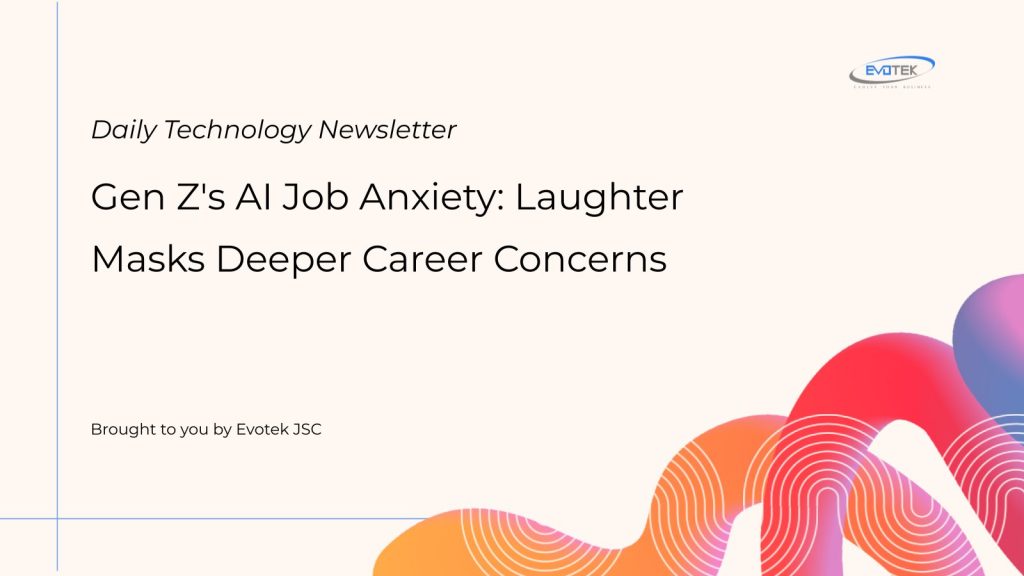A ripple of laughter often accompanies discussions of AI in today’s classrooms, a seemingly lighthearted response to a profound shift in the global job market. For many Gen Z students, humor has become a primary coping mechanism for the unspoken fear of an AI-driven jobs apocalypse. While a student’s casual quip, “Well, we aren’t going to get a job anyway because of AI, so who cares?” might elicit chuckles, it underlines a tense reality: the future workforce senses the immense influence of artificial intelligence and grapples with where they’ll fit in this evolving landscape.
Humor as a Shield Against AI Job Fears
This inclination to laugh off the threat isn’t mere indifference. Many young people admit that dwelling on AI’s potential impact feels “hopeless,” preferring to believe “something else will come along” or that they’ll “figure out how to work with it.” This coping strategy is supported by alarming data. A Goldman Sachs analysis reveals higher unemployment rates for Gen Z tech workers, with a nearly 3 percentage point rise since early 2024 for 20-to-30-year-olds—over four times the national average increase. Economists like Joseph Briggs warn that “those performing the most easily automated tasks—often the most junior employees—are naturally the most vulnerable.” Yet, paradoxically, Gen Z also leads in using AI to inform career decisions, with 42% leveraging these tools, and one in five discovering entirely new career paths through AI.
A New Era of Digital Disruption
While previous generations faced their own economic challenges—Millennials with the 2008 recession, Gen X with offshoring, and Boomers with earlier waves of automation—AI’s unparalleled speed and expansive reach distinguish this current transformation. A 2025 SHRM survey highlights this urgency, finding that 80% of employers expect significant shifts in entry-level job descriptions within just three years due to AI’s influence.
Gen Z’s Pragmatism Meets Fatalism in the Job Market
In response, some Gen Z individuals are strategically hedging their bets. Many gravitate towards human-centric professions like mental health, skilled trades, or education, while others proactively dive into AI skill development. A significant number are also building early side gigs—freelancing, tutoring, and creative work—reflecting a blend of pragmatism and fatalism. As one student put it, “If AI really changes everything, we can’t control it. So I’d rather focus on what I can do now.”
The Risk of Passive Laughter
However, this reliance on humor carries a risk: passivity. Laughing off the perceived threat might offer momentary comfort but fails to foster long-term preparedness. The same humor surfaces in viral TikToks about awkward job interviews, the “Gen Z stare,” and “workplace hacks”—content that resonates because it normalizes genuine work anxieties. Is this enough to navigate an AI-dominated future workforce?
Cultivating Proactive Adaptability and AI Literacy
Economist Tyler Cowen argues that current college curricula often overemphasize routine skills, which AI can now handle more efficiently. He advocates for dedicating up to one-third of higher education to teaching students how to effectively use AI, understand its limitations, and cultivate uniquely human capacities like critical thinking and mentorship. The onus is on educators, employers, and policymakers to leverage Gen Z’s inherent adaptability and intelligence, pairing their distinctive humor—a powerful tool for defusing tension—with clear-eyed preparation. Laughter signals resilience, but it must be coupled with strategic action for future career success.
Bridging Humor and Strategic Thinking for the Future Workforce
To truly empower this generation, we must help them translate quick wit into strategic foresight. This involves embedding AI literacy across all academic disciplines, encouraging students to view AI tools as collaborators rather than threats, and designing robust workplace mentorship programs that connect short-term problem-solving with comprehensive career planning. Rewarding proactive adaptability—anticipating change rather than just reacting to it—will be crucial for navigating the evolving job market.
The Unfolding Future of Work
AI’s transformative power will redefine work across sectors, from creative industries to healthcare logistics. It will undoubtedly birth entirely new career categories while rendering others obsolete at an unprecedented pace. The central question remains: Will Gen Z’s unique blend of humor, adaptability, and cautious pragmatism enable them to ride this wave of change, or will a lack of proactive preparation leave them caught in its undertow? For now, the laughter continues, but the critical work lies in ensuring it’s accompanied by the skills and foresight necessary to convert uncertainty into tangible opportunity for the future workforce.

 日本語
日本語 한국어
한국어 Tiếng Việt
Tiếng Việt 简体中文
简体中文